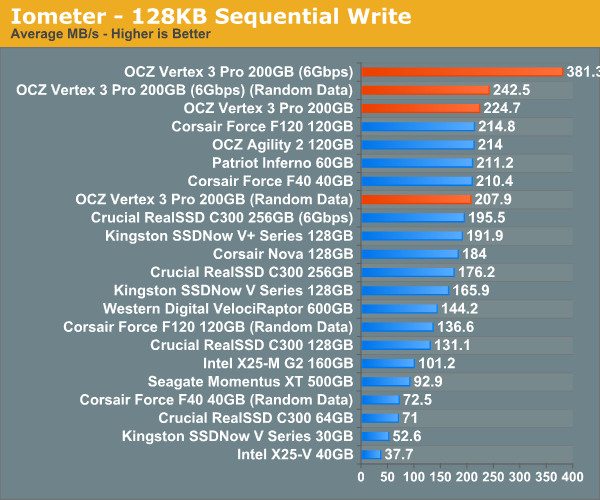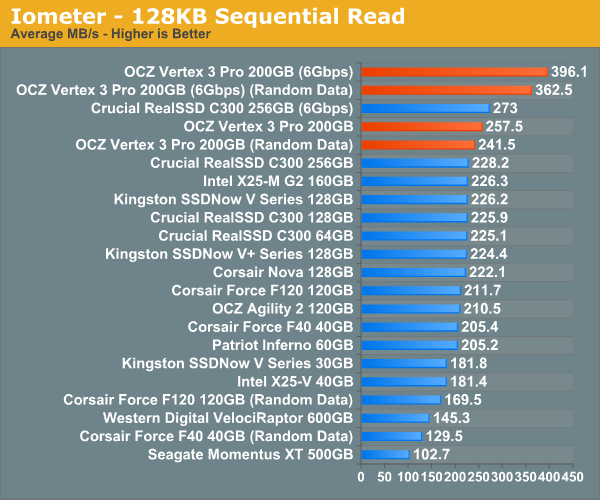OCZ Vertex 3 Pro Preview: The First SF-2500 SSD
by Anand Lal Shimpi on February 17, 2011 3:01 AM ESTSequential Read/Write Speed
To measure sequential performance I ran a 3 minute long 128KB sequential test over the entire span of the drive at a queue depth of 1. The results reported are in average MB/s over the entire test length.

This is pretty impressive. The new SF-2500 can write incompressible data sequentially at around the speed the SF-1200 could write highly compressible data. In other words, the Vertex 3 Pro at its slowest is as fast as the Vertex 2 is at its fastest. And that's just at 3Gbps.
The Vertex 3 Pro really shines when paired with a 6Gbps controller. At low queue depths you're looking at 381MB/s writes, from a single drive, with highly compressible data. Write incompressible data and you've still got the fastest SSD on the planet.
Micron is aiming for 260MB/s writes for the C400, which is independent of data type. If Micron can manage 260MB/s in sequential writes that will only give it a minor advantage over the worst case performance of the Vertex 3 Pro, and put it at a significant disadvantage compared to OCZ's best case.
Initially, SandForce appears to have significantly improved performance handling in the worst case of incompressible writes. While the old SF-1200 could only deliver 63% of its maximum performance when dealing with incompressible data, the SF-2500 holds on to 92% of it over a 3Gbps SATA interface. Remove the SATA bottleneck however and the performance difference returns to what we're used to. Over 6Gbps SATA the SF-2500 manages 63% of maximum performance if it's writing incompressible data.
Note that the peak 6Gbps sequential write figures jump up to around 500MB/s if you hit the drive with a heavier workload, which we'll see a bit later.

Sequential read performance continues to be dominated by OCZ and SandForce. Over a 3Gbps interface SandForce improved performance by 20 - 40%, but over a 6Gbps interface the jump is just huge. For incompressible data we're talking about nearly 400MB/s from a single drive. I don't believe you'd even be able to generate the workloads necessary to saturate a RAID-0 of two of these drives on a desktop system.










144 Comments
View All Comments
Aitam - Monday, February 21, 2011 - link
I know it would bring the load to the CPU rather than the controller, but I wonder if using it on other drives could bring similar results in terms of increased speed or reduced writing overhead...bhougha10 - Wednesday, February 23, 2011 - link
Ok, Anand, enough is enough. I know you know when the G3 is going to be here. Please spill it. Do I want to wait any longer, or is it futile?MarcHFR - Thursday, February 24, 2011 - link
Dear all, Dear Anand,I think it's important to note that AnandTech Storage Bench, like PC Mark Vantage HDD, represent a "best case" for SandForce based SSD.
These benchmarks are based on logs which have recorded accesses to be repeated, but not the data contained in these accesses. These means that the data used in the benchmark may well be highly compressible, which isn’t necessarily the case in real usage.
Hrel - Saturday, March 12, 2011 - link
500 bucks for a 100GB drive?! Are you FUCKING KIDDING ME?!that's LITERALLY 10 times more expensive than it's worth...
I simply do not understand this; who besides Bill Gates and Warren Buffet would buy this crap? No I take that back, both those guys are smart enough to turn down such an offensive value proposition. So I repeat, WHO WOULD BUY THIS?!